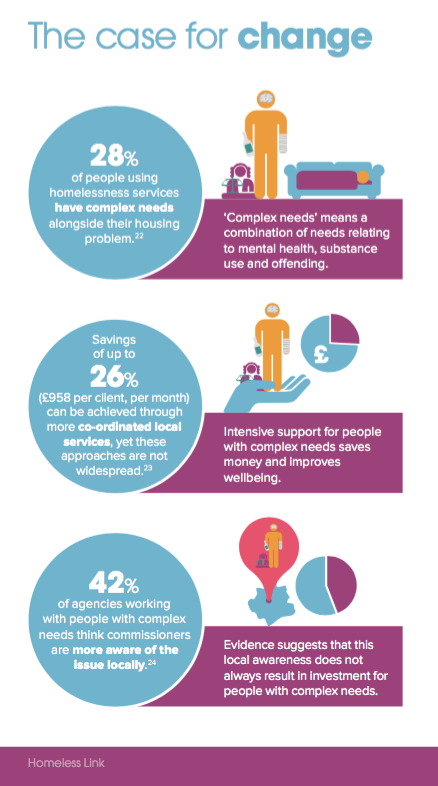This week’s infographic comes to us from Homeless Link, an organization based out of the United Kingdom that works with shelters, advocacy groups, as well as policymakers to create meaningful change in the homeless sector. The infographic focuses on individuals with complex needs who are experiencing homelessness.
The infographic states that 28% of people using homelessness services have complex needs alongside their housing problem. The figure is drawn from a 2014 review of supports for single homeless people in England. The term ‘complex needs’ covers a combination of needs that relate to addiction issues, physical and mental health issues, and involvement with the criminal justice system. Adequately meeting the needs of individuals living with complex needs requires moving beyond a silo mentality, where services operate independently of each other, to an integrated approach that coordinates existing services to meet the needs of these groups.
The infographic also states that having co-ordinated local services can result in savings of up to 26% for clients. The figure is drawn from an evaluation of three pilot programs in England that were designed to improve coordination of local services for individuals with ‘complex needs’. The programs were found to improve client well-being and reduce cost of client service use. While intensive supports for people with complex needs may be expensive in the short-term, it saves money in the long-term and results in a more positive impact for the health and well-being of those individuals.
The term case management refers to “a collaborative and planned approach to ensuring that a person who gets the services and supports they need to move forward with their lives”. Evidently, case management has an important role to play in program service design for individuals with complex needs who are living in critical housing situations. The case management approach emphasizes a client-centered and client-driven approach, this means that the individual at the center of discussion is provided with the opportunity to vocalize their goals and needs. One benefit of this approach is that it results in increased buy-in from clients, as there is a higher degree of engagement with a case management approach versus traditional alternatives.
How can complex needs be addressed in the Canadian context?
The At Home/Chez Soi study, conducted by the Mental Health Commission of Canada examined Housing First as a means for ending homelessness for individuals living with mental illness. Many of the program’s participants had complex needs. The term Housing First is used to refer to programs that combine immediate access to permanent housing with wrap-around supports. The project followed over 2,000 participants over a two-year period across Canada. Demonstration sites included Vancouver, Winnipeg, Toronto, Montréal and Moncton. Throughout the course of the trial, Housing First was shown to be a “cost-efficient, effective and humane solution to homelessness in Canada”.
In order to move forward in the fight against homelessness, it will be important to recognize the presence of complex needs of individuals living in homelessness, and to meet these needs with tailored interventions as exemplified by the At Home/Chez-Soi study.


